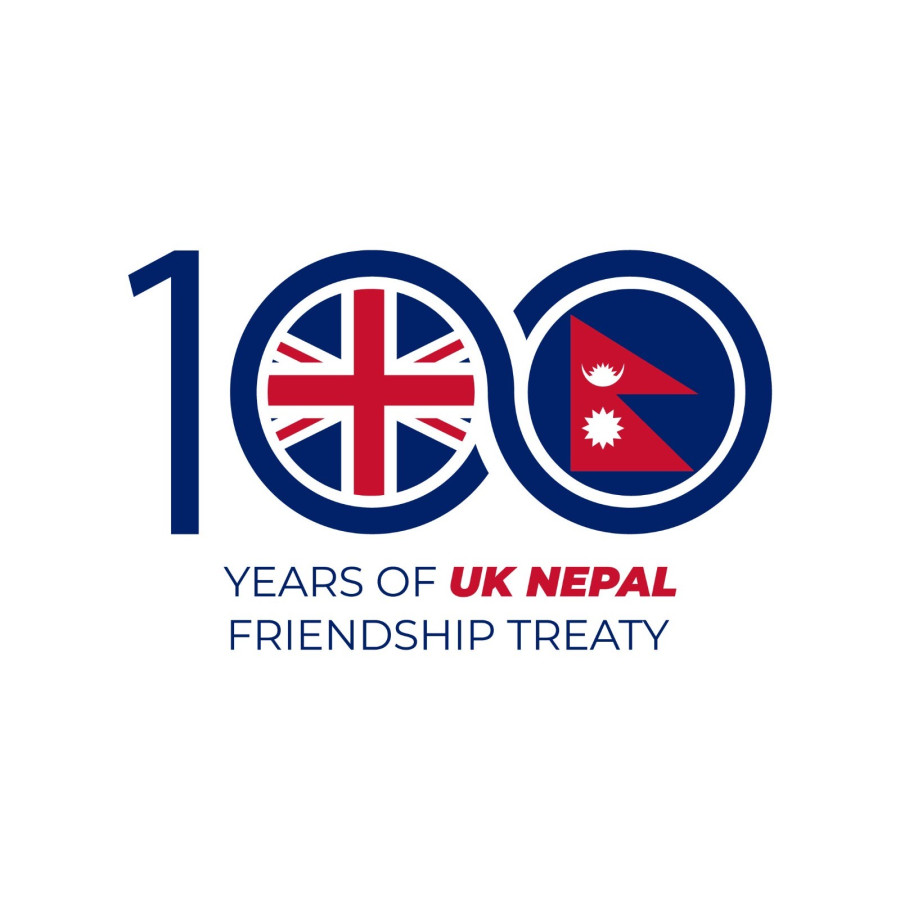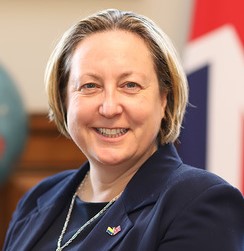Columns
100 years of UK-Nepal friendship
Nepal and Britain will forever maintain peace and mutual friendship and respect each other's internal and external independence.
Anne-Marie Trevelyan
One hundred years ago, in December of 1923, the UK and Nepal signed a historic Treaty of Friendship. This year, we are celebrating this unique, longstanding friendship, and all that it has allowed us to envision and achieve together.
A hundred years is a very long time. Both, the UK, and Nepal have changed in ways we couldn’t have imagined.
A hundred years ago the BBC came into existence. Wembley Stadium was opened to the public for the first time and held the FA Cup final between Bolton and West Ham.
A hundred years ago, if a British minister like Foreign Secretary Lord Curzon wished to instruct Sir William O'Connor, the resident ambassador in Kathmandu on a formal matter, it would take weeks, maybe more for the message to be relayed. Today we do this in seconds. And I’m delighted to note that one hundred years later, both the minister and ambassador are women.
Nepal of course was also a very different place then. The world had not discovered its stunning natural beauty, and rich arts and culture. The country was still closed to the outside world. Nepal had only seen its first car, reportedly driven in across the border from India by the then Prince Edward, a year ago, in 1922.
Everest was climbed for the first time 30 years after that; another epoch moment for Nepal, one that has further reinforced the bonds between our countries.
A lot has changed in the wider world in this time. We have seen wars end and new ones begin. We have experienced the devastating impacts of COVID19 and seen increasingly devastating and frequent natural disasters related to climate change cause great harm.
But we have also seen things change for the better. Our own partnership has grown and shifted to reflect the challenges and opportunities of a more modern world as well as our shared priorities.
Many of you will know that the UK is Nepal’s oldest bilateral partner. We were the first country to establish a diplomatic mission in Kathmandu. Coincidentally, Nepal’s mission in London is the country’s oldest too.
For most British people and people around the world too, the Gurkhas are the first thing that comes up when the UK and Nepal are discussed together. The Nepali men who joined the British Army beginning in 1816, symbolise how far back our relations go. Two hundred and thirty-eight thousand men have enlisted into the brigade of Gurkhas between the two world wars. Over 4,000 serve in the British Army today.
My government and the British people recognise the incredible sacrifices of these brave soldiers. And we cherish the relationship we enjoy thorough the selfless service of those men and the 204 young men who completed the recruitment process just last month. Our support to serving personnel and to veterans is unwavering, through the work of the British Gurkhas Nepal and the UK charity Gurkha Welfare Trust who do incredible work to help veterans and communities here.
Nepal has also grown to be one of the world’s leading UN peacekeeping nations with over 6000 soldiers, including over 500 female soldiers serving 12 different missions. Our work with the Nepal Army is an important part of our growing defence partnership. I do hope that soon, in addition to the 500 female peacekeepers, we will see women Gurkhas.
Talking of working with communities, I am incredibly proud of the UK’s long term, development partnership with Nepal. UK aid reflects the best of humanity – values like kindness and empathy. I had the opportunity to meet with inspiring women stakeholders like Mohna Ansari, Rukshana Kapali and Lily Thapa during my visit. It was evident from hearing them speak that it was similar values that drove their tireless efforts to help empower women and tackle gender inequality.
It is with the support of fantastic partners like these that the UK’s steady investments in health have been crucial in complementing the government of Nepal’s effort to improve women’s access to health services, with a focus on maternal health, family planning and sexual and reproductive health rights.
Thanks to these efforts, eight out of ten pregnant women are now delivering in health facilities, and as many make use of regular antenatal care services. Maternal deaths have reduced by almost three quarters in the past 20 years. During COVID, our health programmes continued to ensure safe access to family planning services, particularly for women from marginalized communities living beyond the last mile. And our security and justice programmes have improved access to nearby and women- and disability friendly police stations for over 2.6 million people, empowering communities to better tackle gender-based violence.
Our health programmes have also helped build crucial health infrastructure: hospitals and health posts in rural Nepal. We have supported the retrofitting and modernization of regional hospitals in Pokhara and Bhaktapur, which serve millions of patients each year.
Protecting the health of Nepalis, and empowering women and girls will continue to be key priorities for us, as illustrated by the launch of the Foreign Commonwealth and Development Office’s new Women and Girls Strategy - Her Freedom, Her Power on Women’s Day last week. It sets out how the UK will continue to put women and girls at the heart of everything we do, and how we will use our resources and expertise to improve their lives.
Our support to Nepal’s education will compliment this focus on women and girls. Education is a top UK priority because it is a direct investment into shaping a better future for all, including Nepal. Our Girls’ Education Challenge programme in Nepal has helped improve education levels for over 30,000 girls from marginalized groups. Even basic education can be life changing.
This focus on education isn’t new. In 1964, Nepal’s late king Mahendra in consultation with the then British Council representative Lynndon Clough, initiated the idea of a school which would provide quality education to students from across Nepal and would celebrate Nepal’s tremendous diversity. This gave birth to Budhanilkantha School in 1972, a unique joint venture with the Government of Nepal providing the land and the UK providing all the technical and financial assistance. Hundreds of thousands of students have benefited from its quality education since.
Similarly, over the last 40 years, our Chevening Awards scheme has enabled over 230 of Nepal’s brightest, to pursue fully funded Masters’ degrees in the UK, home to the world’s best universities. As they begin their Chevening journeys, they become ambassadors for Nepal in the UK and as ambassadors for the UK when they return home.
A part of our development work that will continue to become increasingly important, not only for the UK but for the world, is our ability to tackle climate change. Nepalis have already been subject to its adverse impacts. Having worked as the UK’s International Champion for Adaptation and Resilience for COP26, I will continue to ensure, in my current capacity, that Nepal is able to access additional climate finance for meeting its Nationally Determined Contributions and National Adaptation targets. Nepal was an important and strong ally at COP26, and I applaud its raised ambitions for achieving net zero by 2045. As these risks become increasingly eminent, the UK stands ready to support Nepal on this crucial issue.
Such support has been demonstrated previously by the UK’s specialist search and rescue teams, who landed in Nepal within days of the tragic 2015 Nepal earthquake. Our reconstruction work here lasted years after the earthquakes, working closely with Nepal’s national reconstruction authority. The UK also helped Nepal respond to the corona virus pandemic, including by donating over 2.1 million doses of our Astra Zeneca vaccines, building an oxygen plant, supplying necessary equipment like PPEs and working to build Nepal’s COVID response with the Ministry of Health and Population.
Our support will continue to evolve and work with Nepal as the country graduates from Lower Developed Country status. Although there will be shifts in the way partners work with Nepal, we will be here to provide necessary support. That includes our help to develop Nepal’s economy, to create better investment opportunities. This will encourage the likes of British International Investment, who have committed £125 million to Nepal and are interested in more if the conditions are right, to invest in Nepal. We will also help Nepal make investment decisions in Nepal’s interest and maintain its confidence to attract investment from all countries but remain able to make its choices on its own terms.
Roads and bridges have been the UK’s most visible contribution to Nepal’s sustainable development. In the 1970s and 80s, the UK helped Nepal build two major highways, Dharan Dhankuta Road in east Nepal, the Gurkha heartland, and the Narayanghat-Butwal section of Nepal’s East-West Highway. Between 2000 to 2022, the UK has helped built close to 1160km of rural roads, six motorable bridges and an astounding 2,300 foot-trail bridges in some of the most remote parts of Nepal. Last year, we handed over the 67km long Mugu Humla Link Road to the government of Nepal, connecting Humla district to the rest of Nepal by road. I am hopeful that this important road will transform the region for the better.
Our bilateral partnership has been equally transformative for Nepal. It is based on shared values including on human rights; where Nepal and the UK have stood up together at the UN Human Rights Council and UN General Assembly to defend those without a voice or to rebuke those who seek to undermine the rules-based system. And on the values around democracy where Nepalis have built a democratic system from the tragedy of civil conflict.
Nepal’s democracy is relatively young. There is more work to be done, but fundamentally, the democratic processes are strong. Elections have been conducted in a free, fair, and inclusive manner. Nepal’s strong laws have not only protected but actively promote the interests of the vulnerable and marginalised. There is still more to do - the UK stands with the Nepali people in building on these strong democratic and delivering accountable governance at all levels.
Our bilateral partnership is also based on the benefits to both our countries that come from growth in trade and commerce. Modern British companies are providing expertise to Nepal with on IT and on large infrastructure. Large UK brands like Diageo, JCB and Body Shop have developed a strong presence in Nepal and are important to its consumers. And I hope we can grow this business and investment environment further.
It’s striking that 100 years ago the Nepali and British drafters of the friendship treaty placed up front the line that I will end on. A line I think sums up for me the strength of our bond – one that I hope continues to guide us as friends setting our path for the next century and beyond of friendship:
Nepal and Britain will forever maintain peace and mutual friendship and respect each other's internal and external independence…




 10.12°C Kathmandu
10.12°C Kathmandu















